| Srl | Item |
| 1 |
ID:
101121


|
|
|
|
|
| Publication |
2010.
|
| Summary/Abstract |
This article analyses the gap between government ambitions and actual outcomes in the case of European counter terrorism intelligence cooperation. Specifically, it investigates why Europol has not managed to live up to its tasks despite outspoken government support. Drawing on rational choice institutionalism, the study suggests why bureaucrats might be motivated to resist calls for international cooperation. By examining the process by which Europol has developed as an actor in the counter terrorism field, this article shows how development in the field of intelligence cooperation is not exclusively the reflection of government preferences. It concludes by suggesting that scholars could gain greater insight from a less state centric approach to the study of intelligence. In addition, the article suggests that policy makers cultivate a greater familiarity with bureaucratic factors and that they continually work with those factors in mind.
|
|
|
|
|
|
|
|
|
|
|
|
|
|
|
|
| 2 |
ID:
156911
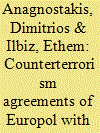

|
|
|
|
|
| Summary/Abstract |
This article investigates empirically the impact of power asymmetry and interest formation in the European Union’s (EU) external relations with third countries in the context of the Europol data exchange and counterterrorism agreements. It focuses on three countries, namely the United States, Turkey, and Morocco, which each have a different level of counterterrorism cooperation with the EU. This article argues that the EU acts as a pragmatic actor with regard to Europol’s data exchange agreements with third countries, and that the power asymmetry between the EU and the third country under question determines the extent of the EU’s flexibility. If the power asymmetry favours the EU, then it insists on its data protection demands. Otherwise, the EU is more flexible towards its counterparts on data protection issues.
|
|
|
|
|
|
|
|
|
|
|
|
|
|
|
|
| 3 |
ID:
080877
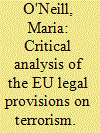

|
|
|
|
|
| Publication |
2008.
|
| Summary/Abstract |
Terrorism activities within the EU are essentially transnational. Given that counter-terrorism operations and prosecutions have been allocated to different actors in different EU member states, operating within quite differing legal provisions and systems, co-ordination by the EU in this area is to be welcomed. In addition to critically examining the new EU laws in this area, this paper focuses on legal framework for the interaction of police, security services, and judiciary across Europe in this task, to include Europol and Schengen provisions. It also pays particular attention to the divergent positions of the UK and Ireland within this framework.
|
|
|
|
|
|
|
|
|
|
|
|
|
|
|
|
| 4 |
ID:
172200
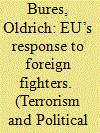

|
|
|
|
|
| Summary/Abstract |
The conflicts in Syria and Iraq have put foreign fighters—individuals travelling from other countries to engage in these conflicts—high on the security agenda at both the national and EU level. Drawing on theoretical arguments previously advanced to explain the haphazard evolution of the EU’s counterterrorism efforts after September 11, 2011, this articles discusses the emergence and persistence of key challenges that have hampered the EU response to security threats posed by 5,000 European foreign fighters between 2013 and early 2017. These include the absence of a common EU-level definition; the differences regarding the scope and perceptions of the threats posed to individual Member States; the lack of consensus on root causes of terrorism and radicalization; and the differences among Member States when it comes to addressing the difficulties of criminal prosecution of foreign fighters.
|
|
|
|
|
|
|
|
|
|
|
|
|
|
|
|
| 5 |
ID:
097170
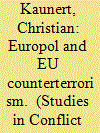

|
|
|
|
|
| Publication |
2010.
|
| Summary/Abstract |
This article offers an analysis of Europol's security actorness in the external dimension of EU counterterrorism. While Europol has attracted some scholarly attention, not so much work has focused on the meaning of its international agreements in counterterrorism. This article aims to investigate the international actorness of Europol at the international level in relation to the fight against international terrorism. It offers original conceptual insights based on empirical case studies of international agreements: Europol agreements with U.S. law enforcement, as well as Europol agreements with countries in the European Neighbourhood policy.
|
|
|
|
|
|
|
|
|
|
|
|
|
|
|
|
| 6 |
ID:
083815
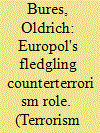

|
|
|
|
|
| Publication |
2008.
|
| Summary/Abstract |
This article offers an analysis of Europol's counterterrorism role. Based on official EU documents, internal reports, and secondary sources, it dissects the contemporary counterterrorism activities of both Europol and the informal arrangements outside of the EU structure that are frequently utilized by some EU Member States. Although Europol does not perform any indispensable counterterrorism functions at the moment due to its limited powers and lack of trust from national agencies, the author contends that Europol has the potential to make a substantial contribution to the fight against terrorism.
|
|
|
|
|
|
|
|
|
|
|
|
|
|
|
|
| 7 |
ID:
080641


|
|
|
|
|
| Publication |
2008.
|
| Summary/Abstract |
This paper traces the history of international police cooperation through the development of collaborative initiatives that various police actors have introduced since the mid-nineteenth century to address transnational crime on a multilateral basis. The beginnings of international police cooperation efforts were largely rooted in anti-anarchist policies pursued by European governments in order to protect the status quo. Police collaboration largely halted during the world wars, but the second half of the twentieth century witnessed an explosion of international cooperation mechanisms in policing as most states came to recognise the importance of multilateral action against transnational crime. International policing now encompasses sophisticated, official and far-reaching channels of information exchange and joint policing strategies and operations. Police cooperation has gone through cycles, however: the political motivation that originally encouraged foreign police agencies to share information on alleged perpetrators and their activities in due course took second place to specifically criminal investigations, but in today's security-driven policy environment the political dimension is once again on the rise, as police strategies are aimed at terrorist groups
|
|
|
|
|
|
|
|
|
|
|
|
|
|
|
|